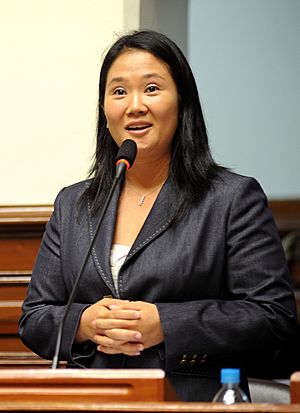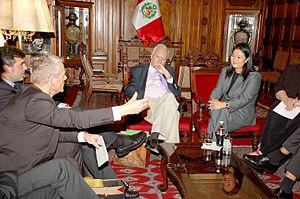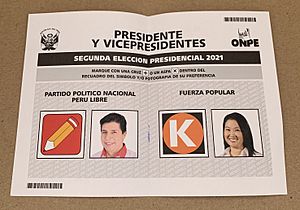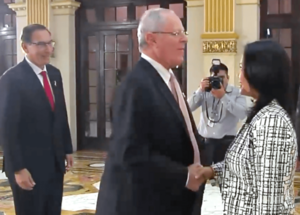Keiko Fujimori facts for kids
Quick facts for kids
Keiko Fujimori
|
|
|---|---|
| 藤森恵子 ケイコ・フジモリ |
|

Fujimori in 2010
|
|
| President of Popular Force | |
| Assumed office 22 July 2009 |
|
| Preceded by | Position established |
| Member of Congress | |
| In office 26 July 2006 – 26 July 2011 |
|
| Constituency | Lima |
| First Lady of Peru | |
| In role 23 August 1994 – 22 November 2000 |
|
| President | Alberto Fujimori |
| Preceded by | Susana Higuchi |
| Succeeded by | Nilda Jara |
| Personal details | |
| Born |
Keiko Sofía Fujimori Higuchi
25 May 1975 Jesús María, Lima, Peru |
| Political party | Popular Force (2010–present) |
| Spouse |
Mark Villanella
(m. 2004; div. 2022) |
| Children | 2 |
| Parents |
|
| Relatives | Kenji Fujimori (brother) Santiago Fujimori (uncle) |
| Education | Stony Brook University Boston University (BBA) Columbia University (MBA) |
| Signature | |
Keiko Sofía Fujimori Higuchi (born May 25, 1975) is a Peruvian politician and business administrator. She is the daughter of Peru's former president, Alberto Fujimori. When she was 19, she became the First Lady of Peru while her father was in office.
Keiko Fujimori has been the leader of the Popular Force political party since 2010. From 2006 to 2011, she was a member of the Congress of Peru. She has run for president three times, in 2011, 2016, and 2021. Each time, she made it to the final round of voting but did not win.
Contents
Early Life and Education
Keiko Fujimori was born in Lima, Peru. Her parents, Alberto Fujimori and Susana Higuchi, are of Japanese descent. Her father was elected president of Peru in 1990. Keiko is the oldest of four children. She attended the Colegio Sagrados Corazones Recoleta, a Catholic school in Lima.
After finishing high school in 1993, Keiko moved to the United States to study. She earned a degree in Business Administration from Boston University in 1997.
Her father's time as president was controversial. While some people praised him for improving the economy and fighting terrorist groups, his government was also accused of corruption and violating human rights.
First Lady of Peru
In 1994, Keiko's parents separated. Her father then appointed 19-year-old Keiko as the new First Lady of Peru, making her the youngest to ever hold that title in the Americas. She stopped her studies in the U.S. and returned to Peru to take on the role.
As First Lady, she was in charge of a foundation called Fundación por los Niños del Perú (Foundation for the Children of Peru). She also started her own foundation to help children with heart problems.
Her parents officially divorced in 1996. Years later, Keiko and her mother reconnected, and her mother supported her during her presidential campaigns.
In 2000, her father's presidency ended after a major scandal. He left the country, and Keiko's time as First Lady came to an end.
Career in Politics
After her father left office, Keiko returned to the United States to continue her education. She earned a Master of Business Administration (MBA) from Columbia University. While in New York, she met and married Mark Vito Villanella.
In 2005, her father was arrested in Chile while trying to return to Peru. This prevented him from running for president again. His supporters formed a new political party, and Keiko returned to Peru to lead it.
Member of Congress

In 2006, Keiko Fujimori ran for a seat in the Congress of Peru and won. She received more votes than any other candidate in the country, a new national record. She served as a congresswoman for Lima from 2006 to 2011.
During her time in Congress, she proposed several laws. One law made it harder for people who committed serious crimes to get out of jail early. Another law required judges to give tougher sentences to repeat offenders.
While she was in Congress, her father faced serious legal charges related to his time as president. Keiko always supported her father and said he was innocent. In 2008, she said that if she became president, she would pardon him.
Presidential Campaigns
Keiko Fujimori has run for president of Peru three times. Each time, she led her own political party, which was first called Fuerza 2011 and later renamed Popular Force.
2011 Election
In 2011, Keiko ran for president for the first time. Her campaign focused on creating jobs, fighting poverty, and being tough on crime. She promised to continue the positive parts of her father's government while avoiding the mistakes.
She came in second place in the first round of voting, which meant she moved on to a final runoff election against the candidate Ollanta Humala. In a very close race, Humala won with 51.3% of the vote, while Keiko received 48.7%.
2016 Election
Keiko ran for president again in 2016. This time, she tried to distance herself from her father's controversial legacy. She signed a document promising not to pardon him if she won. She also said she supported a commission that investigated human rights abuses from the past.
She won the first round of the election with about 40% of the vote. Her party, Fuerza Popular, also won a majority of seats in Congress. She faced Pedro Pablo Kuczynski (known as PPK) in the final round.
The election was extremely close. In the end, PPK won by a very small margin, with 50.12% of the vote to Keiko's 49.88%.
2021 Election
Keiko ran for president for a third time in 2021. In this campaign, she once again showed strong support for her father's legacy and promised to pardon him if she won. She said she wanted to be a president with a "heavy hand" to bring order to the country.
She placed second in the first round and faced the leftist candidate Pedro Castillo in the runoff. The campaign was very polarized, with many seeing it as a choice between two very different futures for Peru.
After another very close election, Castillo was declared the winner. Fujimori and her party claimed there had been fraud, but international observers said the election was fair.
Legal Issues and Political Image
Throughout her career, Keiko Fujimori has been a powerful but controversial figure in Peru. Her political ideas are often described as right-wing and populist. She believes in a strong government and a free-market economy.
Starting in 2018, Fujimori faced serious legal troubles. She was investigated for allegedly receiving illegal money for her campaigns from a Brazilian construction company called Odebrecht. She was held in pre-trial detention several times between 2018 and 2020 but was later released on bail. She has always maintained her innocence, calling the investigations a form of political persecution.
Many people in Peru strongly support her, partly because of her father's legacy. However, many others strongly oppose her for the same reason. This deep division is known as "Fujimorism" and "anti-Fujimorism," and it is a major force in Peruvian politics.
On September 11, 2024, her father, Alberto Fujimori, passed away at her home.
See also
 In Spanish: Keiko Fujimori para niños
In Spanish: Keiko Fujimori para niños
 | Dorothy Vaughan |
 | Charles Henry Turner |
 | Hildrus Poindexter |
 | Henry Cecil McBay |



